The human brain is capable of handling 1016 processes per second and yes, it’s perfectly fine if this freaks you out (it scares me too). It’s because of this particular feature that your content has to generate engagement. Our brains won’t focus on something unless it’s going to seem highly useful or very eye-candy, so pushing your articles into your reader’s’ eyes can be quite a challenge.
There’s a pretentious term describing how our brains refuse to be rational sometimes and operate faultily instead, because it’s more comfortable – it’s called a cognitive bias. We all have them, no exception – of course, some more than others. What is truly impressive is how we are not even aware of these biases’ existence most of the times; and even when we manage to identify them, it’s still very unlikely to change our mind. Therefore, there are plenty of criteria to be taken into consideration when addressing the mind – we’re dealing with a glorious mess here.
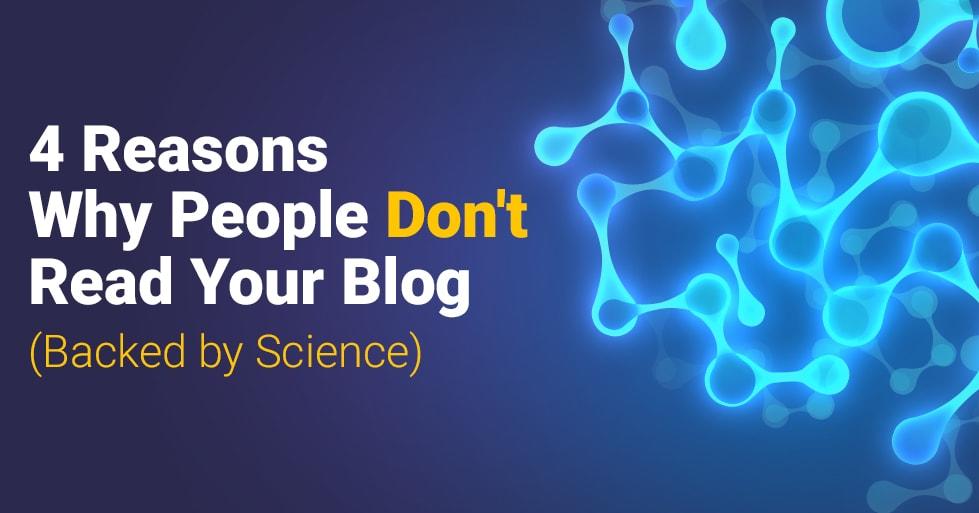
As much as we hate this truth, our decision making processes are more of a black box than a clean, coherent causal chain. It is because our brains love shortcuts that we don’t rationalize our every decision, but rather start from some implicit premises when evaluating, say, a purchase decision. Same happens for every thought process that involves perception – in other words, you may be sending some messages you’re not aware of in your articles that prevent people from returning to your blog. In this article we’ll be analyzing these cognitive phenomena applied to your domain and try to find the some blog content strategy that can be applied to your niche.
You Don’t Write Up to the High, Positive Expectation
It does hurt to say, but the more you read meaningless content on the web, the more you expect the next link you click on to give you hands on content. If you’re unlucky enough to be the fourth or fifth and the reader is already bent out of shape, you clearly wouldn’t like to be in the position of disappointing him.
The mechanism behind this is quite simple, and we’re not proud of it. Our brains make the same mistake as the gamblers’ do. The more you lose, the more you’re under the impression that you’re actually about to win.
Unfortunately, if you don’t focus on answering the questions of your audience against their needs checklist, you’re on the highway to failure. Take the example of Giuseppe Fratoni – he is a digital marketer, which means he knows the bread and butter of content strategy. Unfortunately, this didn’t help him grow a community – because of not delivering content up to people’s expectation. We’re much past the period when clickbait solved any problem.
It’s harder to work for content than it was for linkbait and clickbait years ago, because this time there’s no shortcut to get people’s attention. You’ve got to be fair and you’ve got to deliver. Let’s call this Attention Web.
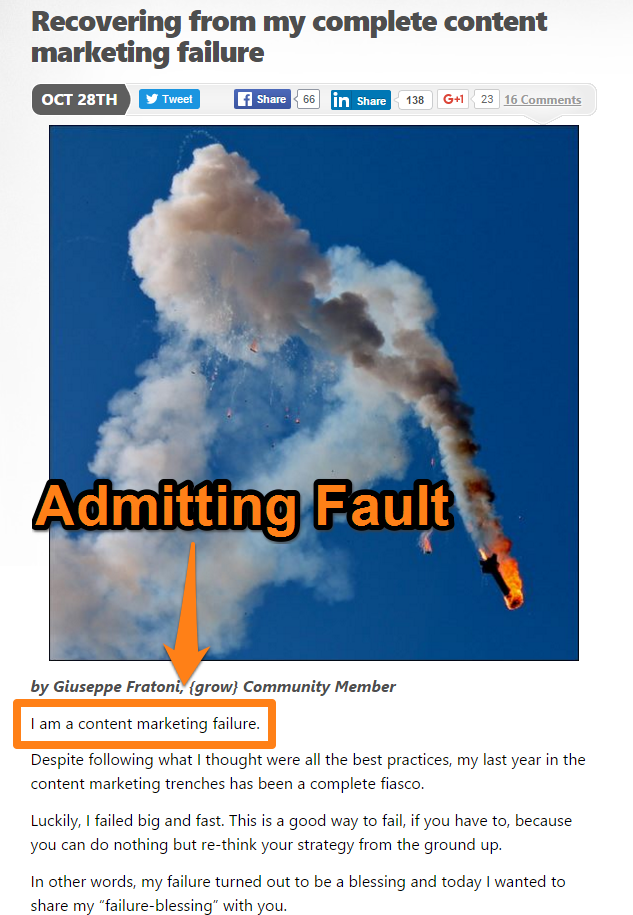
You’ll say it’s like flipping coins – you’ve already lost twice, so you think the chances are you’ll win the third time. Actually, that is false – as the odds are 50/50 every time you flip the coin, however much you’ve lost or won. Very often, we neglect probability – we tend to believe that plane trips are more dangerous than car trips, for instance, when the facts clearly contradict us.
For instance, one of the easiest ways of making sure that people won’t last too long reading our content is working on analyses that are too in-depth. They require significantly more time reading than your generic blog post, which leads to a high bounce rate.
Tl;dr – It’s not unknown that the abbreviation comes from too long; didn’t read and it’s either used at the beginning of a paragraph to inform that reading it entirely will take a while (not quite as much as Tolstoy, but somewhere around there) or a way of mocking people who don’t possess any knowledge on how to effectively write on the web.
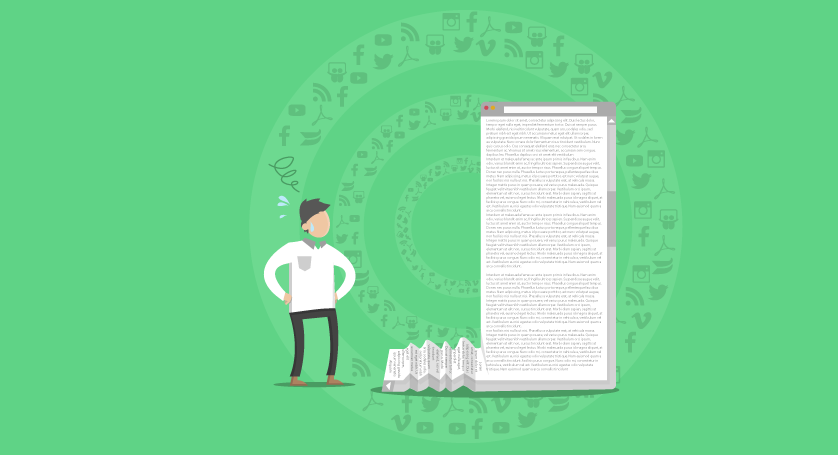
So Wikipedia decided to make a thing out of this, and summarized long articles that people will search to read about in a very tl;dr-friendly way. We’re only looking for the essential information scanning the texts instead of reading them, so this initiative is meant to mock our inherently-developed habit of superficial reading.
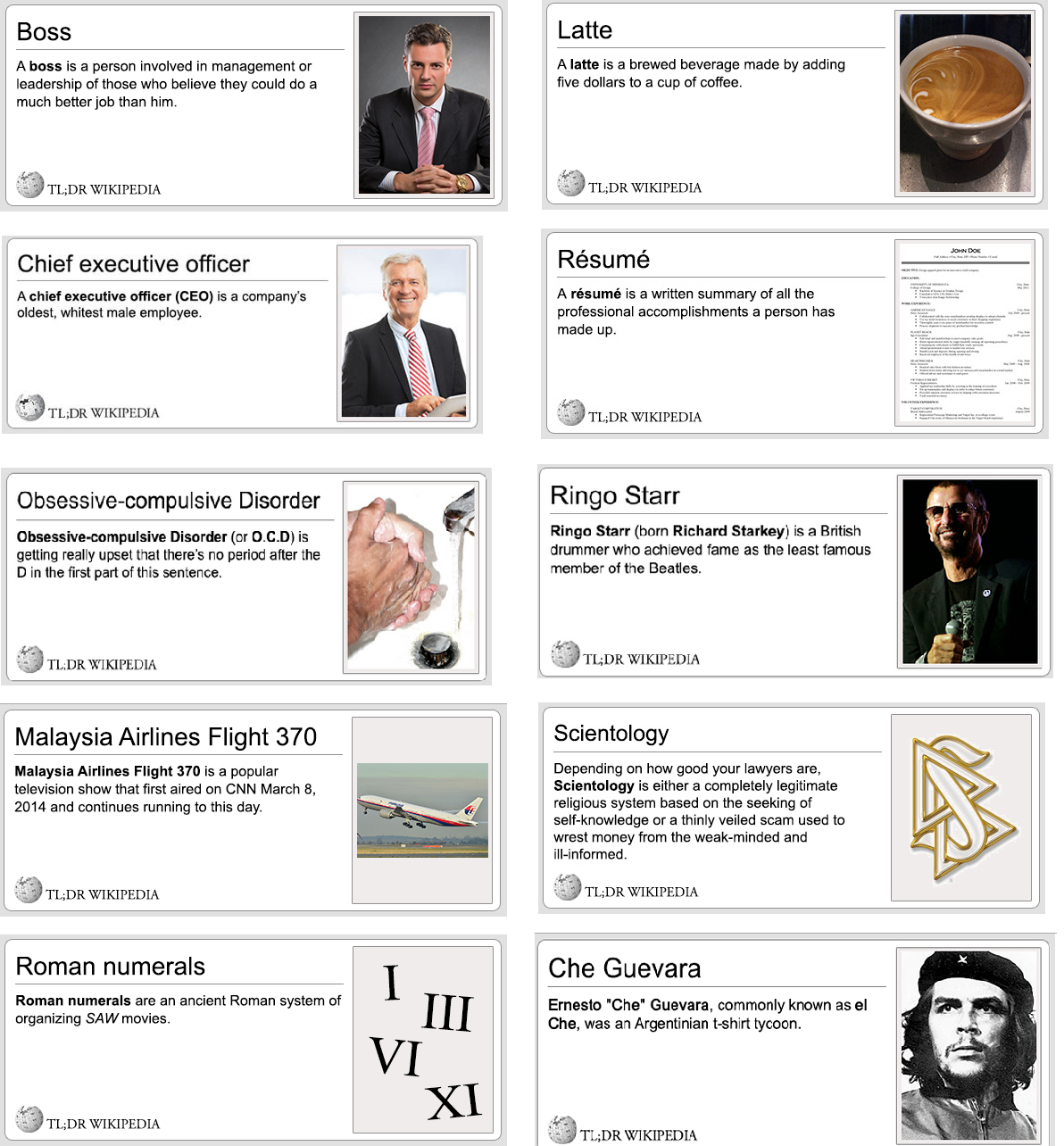
Besides being mocked all over the web, this ‘too long; didn’t read’ issue is a relevant obstacle when trying to convert your audience to visiting more often. Once people believe that your general style requires a lot of time, there’s no turning back.
What I’ve learned: Only promise what you can deliver! And don’t make it ‘War and Peace’.
People Don’t Agree with Your Opening Statement
We’ve mentioned cognitive biases before. That’s a reality; however bold points of view are lifesaving. They raise eyebrows and tickle curiosity, while sending the impression of reliability. Which is why people will read the first sentence of your post – unfortunately, after this they realize you’re about to contradict their prior beliefs and leave. Just like that.
Let’s take the example of Spectafy. Their first landing page was very successful, according to their own statement – it converted. People liked the idea of their application and the landing page was lucrative.
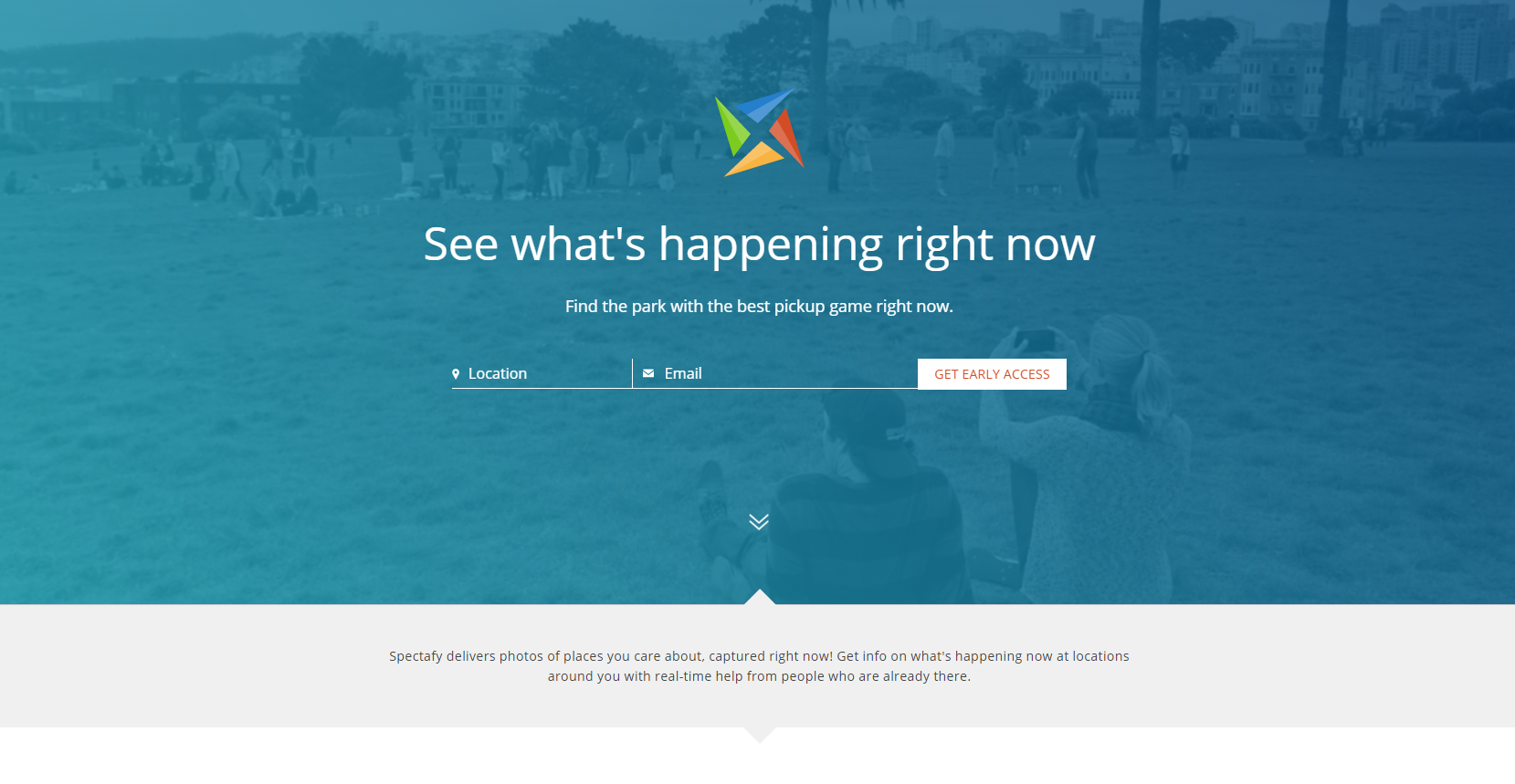
But it’s not in our nature to settle for things – so they wanted more people to convert. Which is why they decided to use sarcasm in order to stimulate productivity. Unfortunately, the success rate was dramatically lower – close to zero, in fact. Because we don’t like being told that we’re wrong, at least not like this. Too bold a statement scares us away. Not because the idea is not good, but because it’s not what we’re there for.
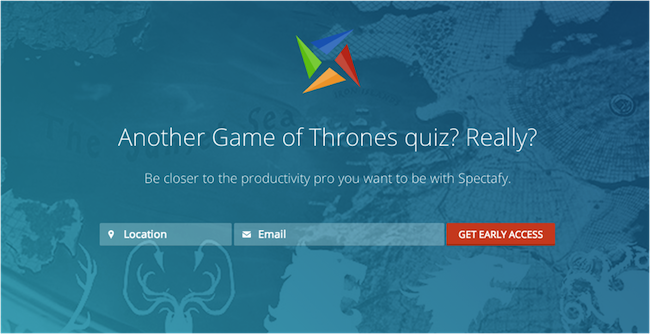
If you haven’t managed to persuade your readers in the first 100 words, it’s safe to say you most likely won’t at all. This is because we tend to remember, search for and find more powerful the information that supports our beliefs.
It’s hard for the brain to accept new perspectives, because it has to tune the previous life facts to the ones you’re presenting – which takes a lot of will.
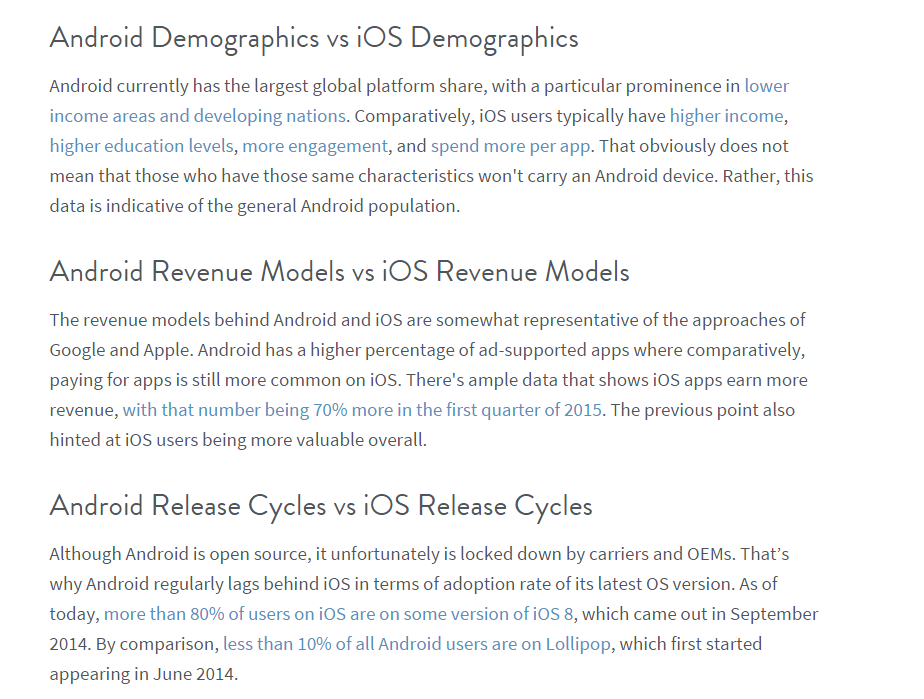
Instead, you may succeed to do the opposite – presenting enough proof to make your idea reliable can trigger a defense mechanism called the backfire effect.
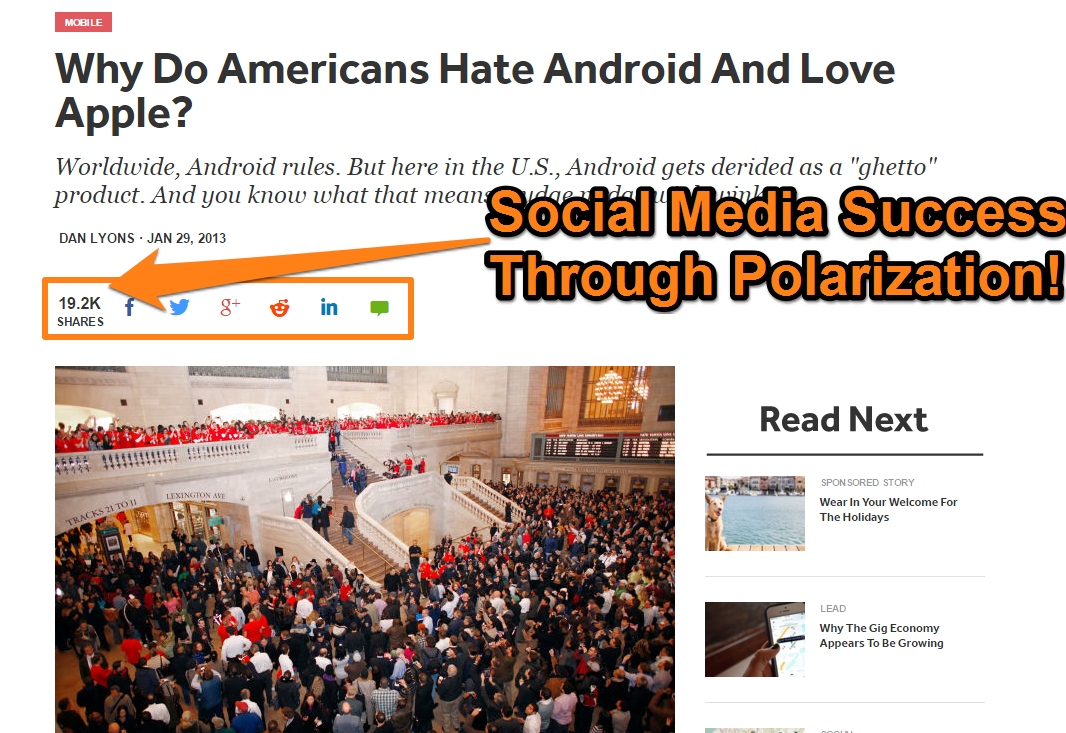
Don’t worry! Nobody’s safe. From the scientific world to steak recipes, this tendency can sabotage your efforts in ways you couldn’t have foreseen. Take this search on BrandMentions for instance, where I searched for Android and iOS.
I have 897 returned results, counting only the ones that have mentioned both the brands. It’s against our biases, it seems, to give up polarized opinion to the detriment of accepting other perspectives.

We all have belief biases – this means that when facing a logical argument, we’re more likely to believe it if the conclusion seems more plausible instead of analyzing the supporting evidence.
What I’ve learned: Be crystal clear and give quick previews that make your points of view acceptable, even to people who wouldn’t agree at first.
You’re Too Deep. Seriously, Stop It.
Doesn’t it happen to you to read about something new or gain interest in a new topic and then see it virtually everywhere? If you experienced it at least once, it shouldn’t surprise you that there’s some serious science behind this. An illusion of frequency populates our thoughts. For instance, if you’ve bought a new phone, you’ll tend to notice that a lot of people have the same phone model.
And while you’ll think this helps your endeavor, it’s not quite like this. Suppose that you’re lucky enough to write about the topic someone’s recently been interested in – this only means they’ll notice your work, at best. From here to actually reading your content is a lot of work paved with intermediary steps.
The picture below is what happens with Slate – and consider they’re lucky. Most of the people who land on your page don’t get through the first paragraph and leave the site for good.
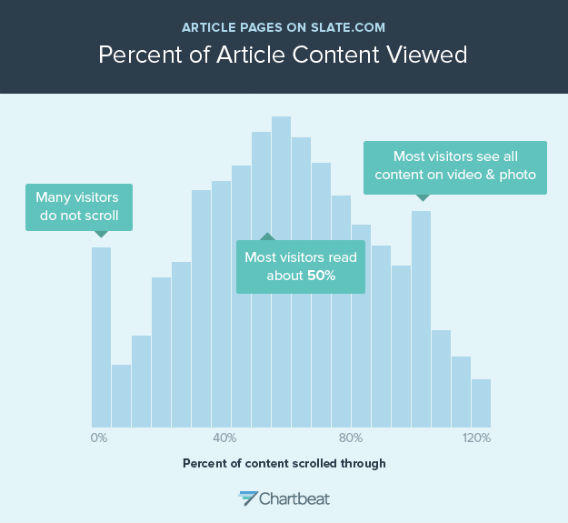
You’ve also got to take into consideration that people on the web aren’t really organized. The hyperlinks have made us chaotic in ways that were impossible in terms of brain wiring only a few years ago. Plus, it’s not always going to be your topic the one that’s the most recent interest of someone – so don’t count on that. Rather, the goal would be writing despite that – content so good that makes ignoring impossible.
There’s no glory for the underdogs in content marketing.
But this comes with its disadvantages as well. Unfortunately, digging too deep into a topic often implies taking a lot of extra risk. We only read in-depth content analyses; we do our homework properly, we’re never out of touch and we can tell you what’s trending from sleep. And yet, there’s nothing easier than losing the interest of your readers.
This article on Medium says we’re not supposed to write blog posts that take more than 7 minutes to read.
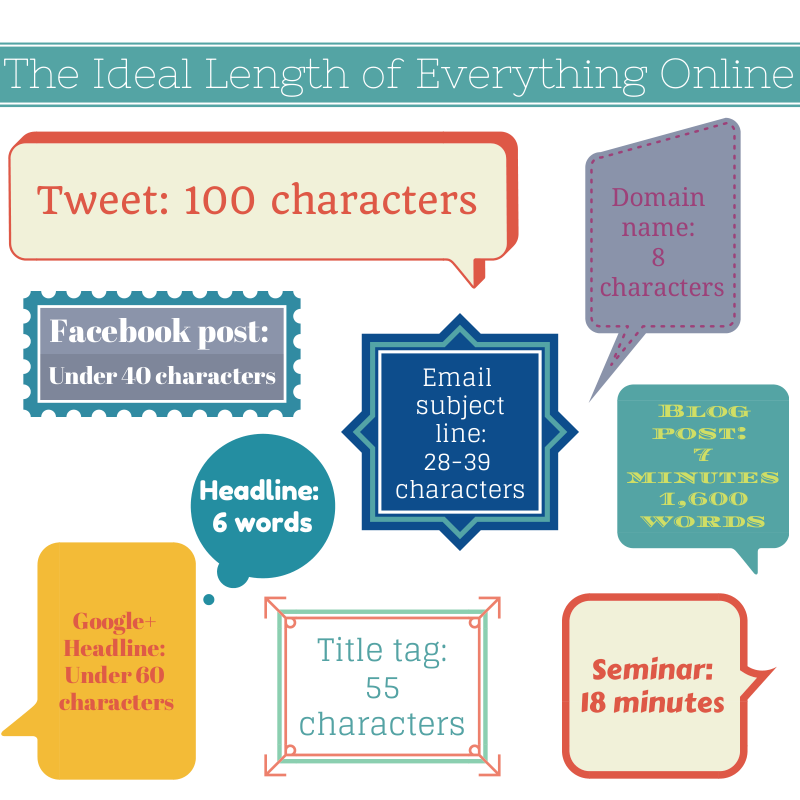
Let’s also take into consideration that according to studies, our reading behavior online is a very dissimilar process to paperback reading. It seems that we perceive the content on the web not with the part of the brain responsible for reading, but with the one responsible for images.
Thus, we merely scan the content we’re interested in.
The second we bookmark a link we forget about it – there are very few of us who actually track back their online activity to see what they found impressive, but maybe just didn’t have the time to read on the spot. What’s rather common is people bookmarking your article. And you don’t want this to happen!
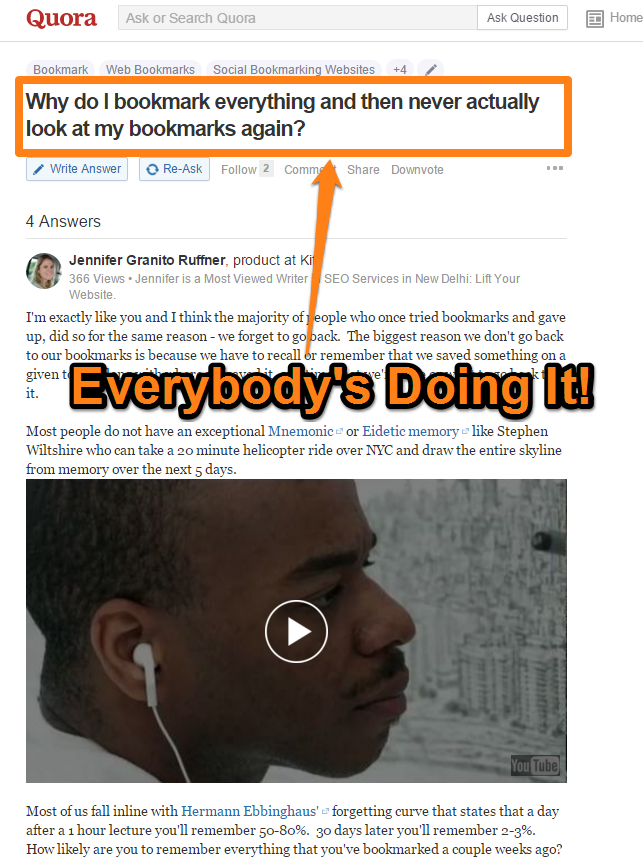
Source: https://www.quora.com/Why-do-I-bookmark-everything-and-then-never-actually-look-at-my-bookmarks-again
There’s a theory addressing the choices we make for now and the ones we make for later – an illustrative experiment showed that when buying food from the supermarket (say chocolate and oranges) we’ll buy more oranges – thinking we’re going to eat healthily. However, when the moment of decision comes, we’re going to pick the chocolate instead of the fruit. Same happens with bookmarks – and Patrick Gant from Thinkitcreative agrees with us on that.
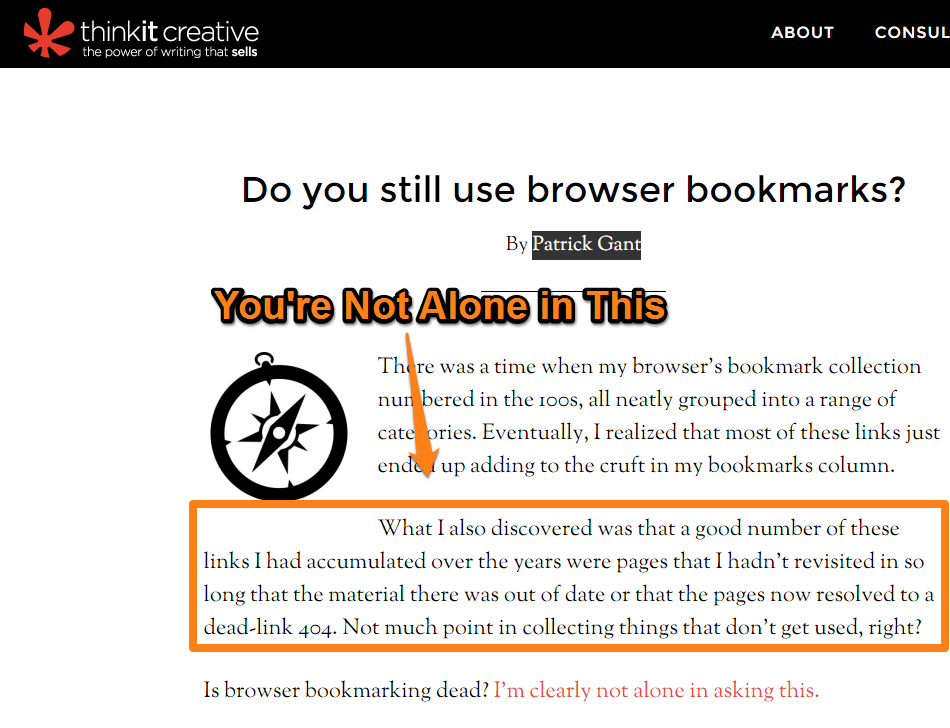
Because of the quantity of information we deal with everyday and the very transparent environments that provide us the content, there’s a slim chance that we’d retrace our steps instead of searching for entirely new posts.
The thing is, the more complicated you sound, the more people will live under the impression that they need a lot of time to understand your post properly – and, however interesting and vision shifting, it will end up unread.
What I’ve learned: Don’t try to sound too smart, deliver something valuable in an intuitive way instead. Make it easy to read!
People Prefer the Status Quo Over Newly Presented Facts
It’s a miracle we get any decisions right, considering how many factors influence our perception without us having a clue about it. For instance, we care more about maintaining our Status Quo (state of facts) than we do about truth; and if you’re saying otherwise, chances are your brain is playing some tricks on you.
‘Our mind is fooling us in a repeatable, predictable, consistent way.’ Dan Ariely
For instance, it’s not like we objectively liked the former Google logo. Admit it, the new one’s more tuned to our expectations, if we’re to think regardless of what we’re used to. It was age-old, and as much as a veteran of the web is acknowledged, the serif font with the typewriter-like g didn’t suit the current image of Google – with a sharp, progressive, minimalist approach. And yet, here we are, complaining for the sake of habit.
What I’ve learned: If it’s not imperative to change, innovation for the sake of novelty is the number one enemy of reader loyalty.
Conclusion
The information technology has changed our lives for good, so says the cliché. From the posts we share without reading to the content we skip because it looks like a block of text rather than something to visually stimulate us, nothing resembles how we read old media. For the nostalgics who think of the good old days while reading this, I stand by the fact that this perspective mutation isn’t necessarily a disaster; not as long as we can prove the same adaptive mechanisms on the web as we did throughout the other organic changes of humankind.
Photos: 1, 2, 3.

 Site Explorer
Site Explorer Keyword tool
Keyword tool Google Algorithm Changes
Google Algorithm Changes

Yea. You’ve got good points here. I solely agree with the number one point. “You Don’t Write Up to the High, Positive Expectation”
People hate wasting time on things they feel are not solving or answering their questions